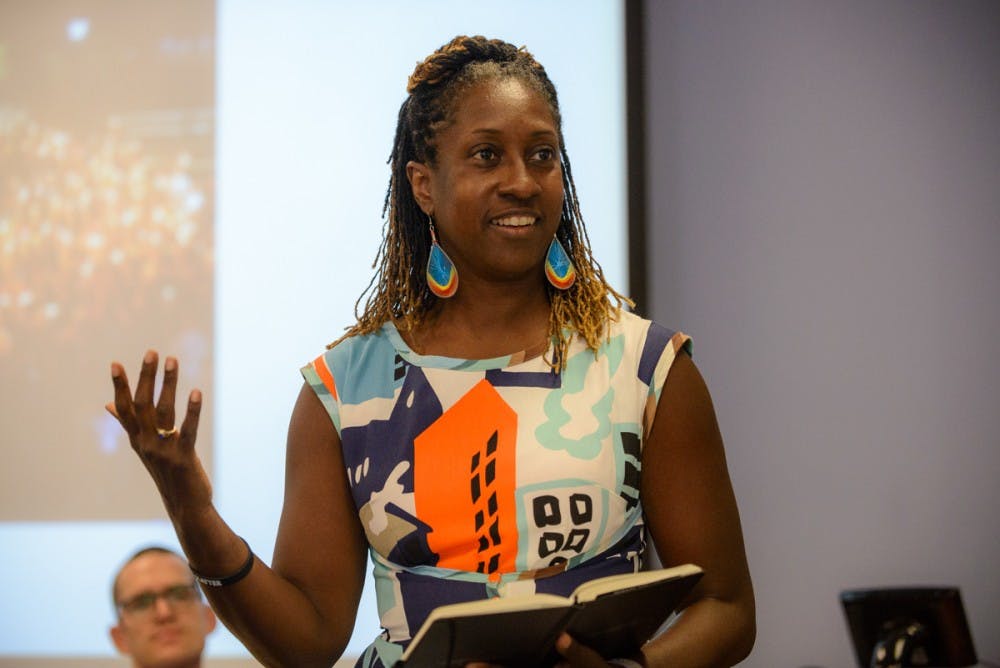The Office of the Provost and the University Library organized and hosted a series of dialogues on race and inequity Saturday in order to “further education and dialogue around issues brought to the forefront in Charlottesville — and across the country — after the events of Aug. 11 and 12.”
The dialogues were originally scheduled for Aug. 12 as a response to the “Unite the Right” rally in downtown Charlottesville but were canceled due to safety concerns in response to violence which occurred at the demonstration.
The dialogues included more than 30 individual discussion forums and four film screenings presented by a number of University students, professors, faculty and administration — including Dean of Students Allen Groves and Tom Katsouleas, executive vice president and provost.
In a statement on the dialogue series, Katsouleas emphasized the importance of maintaining civility and allowing free expression as part of the discussions.
“The University remains committed to supporting free expression and is prepared to ensure that discourse remains peaceful at all times,” the statement read. “We welcome all members of the U.Va. and Charlottesville community to participate in the academic program we have scheduled.”
Katsouleas hosted a dialogue session titled “Intolerance of Intolerance” in which he discussed the preservation of freedom of speech while rejecting the white supremacist ideology displayed at the “Unite the Right” rally.
“We must insist that other views than our own are heard, even those offensive to our sensibilities,” Katsouleas said. “We must speak out against speech or actions that are ad hominem attacks on a person or class of people because such speech prevents other voices from being heard. Thus at times we must be intolerant of intolerance.”
Katsouleas further said the safety of University students and faculty was a central priority for him as provost.
“I think it’s important for us to stand up and show support for all of our community and condemn anything that is said or done that physically threatens any members of our community and any threat to expectations of equality in all aspects of community life,” Katsouleas said. “I certainly draw the line at anything that is either physical safety or intimidation. We have to absolutely be intolerant of intimidation and physical threat.”
A graduate Nursing student, Gabriella, expressed her concerns to Katsouleas about the ability of intolerant groups to harass and assault students on the Lawn. In response, Katsouleas cited the Board of Visitors recent decision to designate the lawn as a residential zone.
“You do draw the line at the safety of students in a living space like the Lawn,” Katsouleas said. “We brought to the Board [of Visitors] a proposal to make the Lawn a facility [which] limits to some extent and gives us the ability to control, to some extent, what happens there.”
Groves also co-led a discussion with John Unsworth, an English professor and the dean of libraries, emphasizing the importance of protecting University students from violence while being receptive to opposing viewpoints.
“The question that remains unanswered … is where is that line going to fall between protecting students from the legitimately aggressive, attacking harassment that a university should have a duty to do and allowing students to be made uncomfortable by certain viewpoints,” Groves said.
“[There are] topics that they might, in an internet enabled world, choose to shield themselves from by not following those people, by not looking at those news sites — by cabining themselves off from things they don't agree with,” Groves added.
Third-year College student Melissa Katz attended a lecture on “The Demographics of Race in Charlottesville.” She said the dialogue around the events was important to ensure “that people are aware and actually care about what’s going on — because it’s not going away.”
“[The students] … choose not to talk about it because they’re scared or too privileged or don’t think it applies to them,” Katz said.
Fourth-year College student Maeve Curtin — an organizer of the initial planning and student outreach for the dialogue series — explained the importance and significance of the discussions in an interview.
“I think it’s really important for people to be more aware of what’s going on in the Charlottesville community,” Curtin said. “[The goal] is to critically discuss what was happening and why it was happening in our community.”
“It is my hope that at least for some of those people who are able to attend [the dialogues,] they are inspired by something they hear or learn or by a conversation they have with someone sitting in the room,” Curtin added.
Curtin also said hateful and discriminatory speech should be rejected as it does not contribute to civil discourse.
“There needs to be an intolerance of intolerance,” Curtin said. “Speech that is solely intolerant and does not further any sort of discussion [but] rather it shuts it down — that’s not something we should be tolerating.”
Looking forward, Curtin said she was hopeful that Saturday’s dialogues were the first of many opportunities ahead for civil discourse on race and inequity at the University and in Charlottesville.
“[After the dialogues] it is especially important that people continue to engage with these things … I think everyone involved with the planning recognizes that and is very aware and ready to provide that need to the larger community,” Curtin said.







